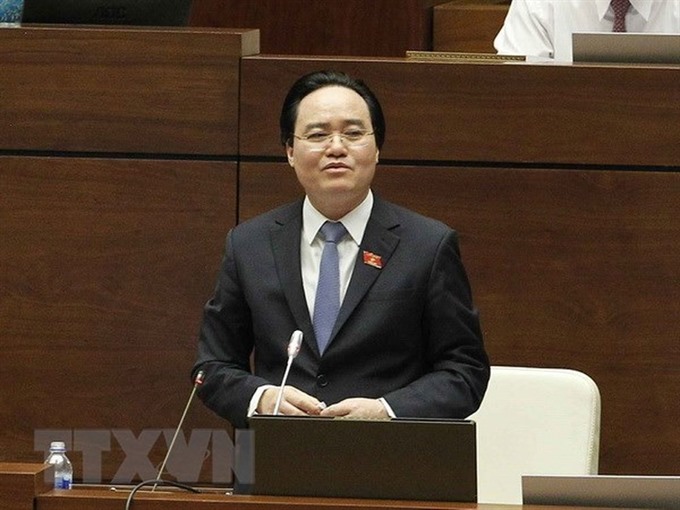.jfif) Opinion
Opinion

Minister of Education and Training Phùng Xuân Nhạ talks with Vietnam News Agency about education on the occasion of the start of the new school year.
 |
| Minister of Education and Training Phùng Xuân Nhạ. |
Minister of Education and Training Phùng Xuân Nhạ talks with Vietnam News Agency about education on the occasion of the start of the new school year.
Floods and heavy rains caused bad damage to several northern provinces before the new school year. How did the education sector ensure all students could go to school on schedule?
To prepare for the new school year, the Ministry of Education and Training and local governments made strong efforts to repair schools and classes and set up equipment for the new school year.
This year, floods and heavy rains caused damage to schools of several provinces in the northern, central and Mekong Delta regions.
For example, in northern Sơn La Province, the boarding school for ethnic minority students in Mai Sơn District was almost destroyed.
Before the new school year started, I visited Sơn La Province to review preparation for the coming academic year. I did appreciate the hard work of the school’s teachers and soldiers for their help to repair the boarding school so the students could come back on schedule.
This year’s school year, the ministry plans to implement nine tasks and five measures which were set two years ago. Which tasks will be the priority?
This year, the ministry will focus on restructuring education networks from pre-school to tertiary including re-planning teaching staff as well as investing in infrastructure facilities.
The restructuring of pre-school and elementary education is the responsibility of local governments. The ministry has given standards and instructions to each province as preferences.
In terms of fostering education and training staff, this is one of the key tasks. This task will decide the success or failure of the process of education reform.
The ministry has issued new criteria for teachers and principals. This could be considered headway in the reform process. This was because the new criteria will help improve the quality of teachers and educational managers.
The ministry was consulted by foreign experts and conducted several surveys among teachers and education managers before issuing the criteria.
In this school year, the ministry will make plans to provide further traininig to improve the quality of teachers and principals based on the new criteria.
Another task of this school year is that local governments were asked to focus on reinforcing facilities to prepare for a new general education programme.
Besides, improving teaching and learning foreign languages, particularly English, will also be paid attention to this year.
For tertiary education, the ministry will continue to push self-dependence for universities. For the past three years, the trial implementation of autonomy for 23 universities has brought positive results.
One of the key tasks of the education sector is to prepare facilities and staff for a new programme of general education. Are there any difficulties which could affect the process?
Implementing the new programme has been prepared since 2015. The new programme will meet the requirements of a modern education.
The two decisive elements are teaching staff and schools’ facilities. A good programme can not work if teaching staff and facilities are below the demand.
The new programme will focus on developing students’ capabilities and virtue.
The Ministry of Education and Training has worked with the Ministry of Home Affairs to improve benefits and welfare for teachers.
In terms of school facilities, this depends much on the ministries of Finance, and Planning and Investment.
However, investment in schools needs the involvement of local governments as well. — VNS




